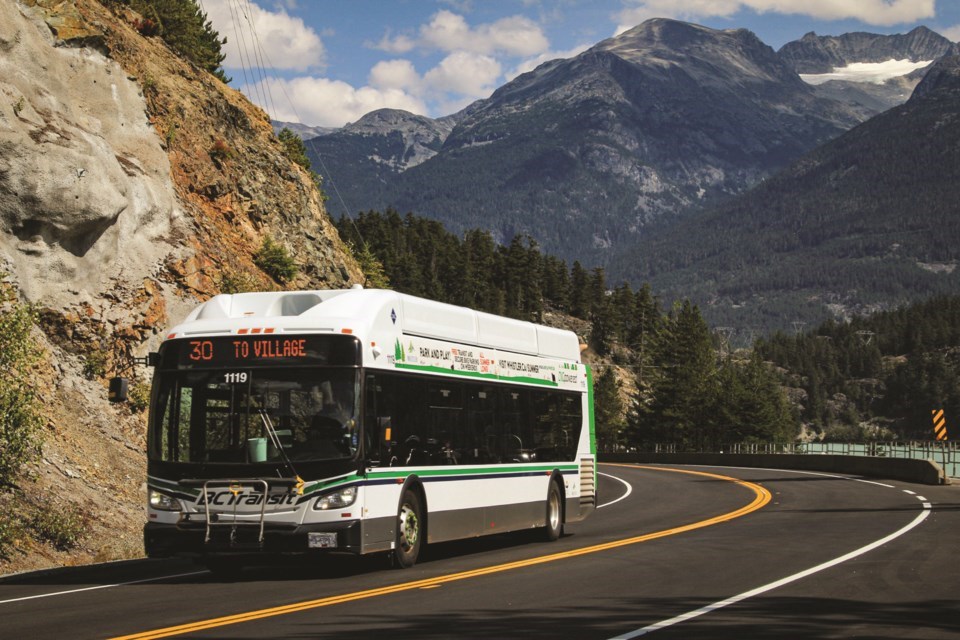After the longest transit strike in B.C. history kept Whistlerites off the bus for more than four months, local officials are hoping to entice riders back onboard with free transit through Labour Day and discounts on long-term passes through Halloween.
Whistler’s mayor and council approved the incentives on Tuesday, June 21, a week after the union representing local transit workers and BC Transit contractor Pacific Western Transportation agreed to a new collective bargaining agreement, ending the strike on its 137th day.
“I know this strike has been an enormous burden on this community,” said Mayor Jack Crompton during the council meeting. “We are committed to earning back our loyal transit ridership and we’re excited to see you onboard again very soon.”
Transit will be free through Sept. 5, aligning with the District of Squamish. In an effort to encourage long-term ridership, the municipality is also offering discounts on monthly, six-month and 12-month transit passes through Oct. 31. Until then, monthly passes will be available for purchase at 30-per-cent off, six-month passes at 40-per-cent off, and year-long passes at 50-per-cent off.
“This is really great. This is clear,” said Councillor Jen Ford. “Squamish is doing this and I think the people who typically would buy a pass are people who would use it every day. They may or may not benefit from the free weekends, so they’re still paying for free transit. I think the benefit we’re looking for is to drive people to see the benefit of long-term transit passes.”
The Resort Municipality of Whistler (RMOW), like other local government partners, covers 53 per cent of the community’s operational transit costs, with BC Transit responsible for the remainder. The RMOW also takes in 100 per cent of local fare-box revenue.
Over the course of the strike that began Jan. 29, the municipality saved approximately $1.4 million in costs, but missed out on roughly $950,000 in fare and pass revenue. That puts the RMOW’s net savings at about $450,000, enough to cover the anticipated cost of the loyalty program, which is estimated between $350,000 and $450,000.
The municipality can also take advantage of federal-provincial Safe Restart funding, financial relief extended during the pandemic to help transit agencies recoup ridership. The RMOW intends to utilize about $1 million in restart funding in 2022, and anticipates having another $3.5 million from that fund available at the end of March 2023.
“So if we do, we will use that money up over the next couple of years,” said the RMOW’s general manager of infrastructure services, James Hallisey. “We don’t believe that our fare revenues are going to bounce back particularly quickly.”
As part of the resolution that passed Tuesday, municipal staff was directed to request BC Transit compensate the RMOW for missed fare-box revenue during the strike, as well as hitting pause on lease-fee payments for Whistler's transit facility equivalent to the length of the strike.
Also at Tuesday’s council meeting, officials voted in favour of reallocating 550 transit service hours previously intended for the free Lost Lake shuttle to other routes, the equivalent of seven full days of service during the peak December period.
“Compared to our usual 74,000 total [service] hours, it isn’t huge, but it’s still significant and can still make a difference,” Hallisey added.
The Lost Lake route, meanwhile, will be incorporated into the free Rainbow Park shuttle that was introduced on weekends and holidays in the summer of 2020.
Transit service resumes in Whistler tomorrow. The RMOW had pushed for an earlier restart, said Hallisey, but BC Transit indicated it would have been difficult to get transit going again any sooner.
To stay up to date with transit service and schedules, visit bctransit.com/whistler.





